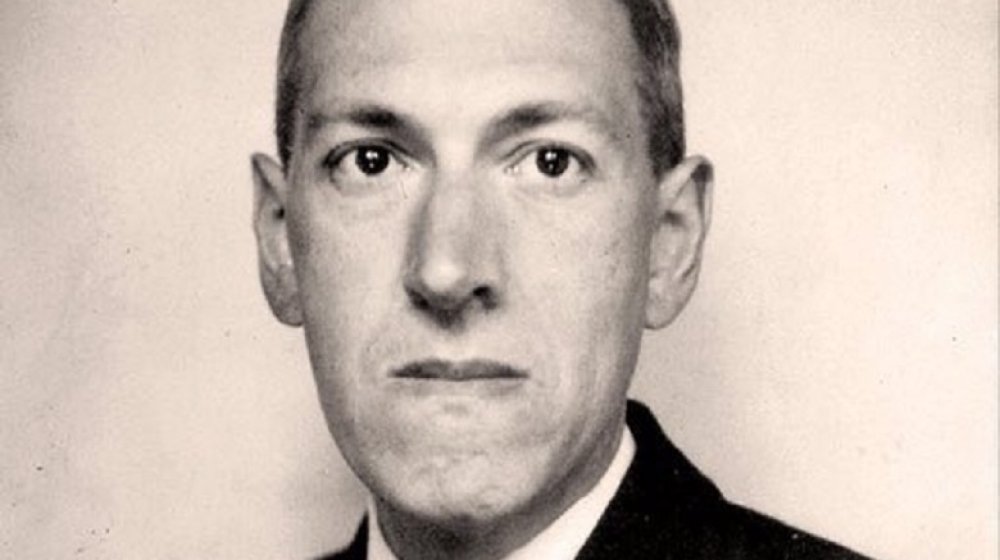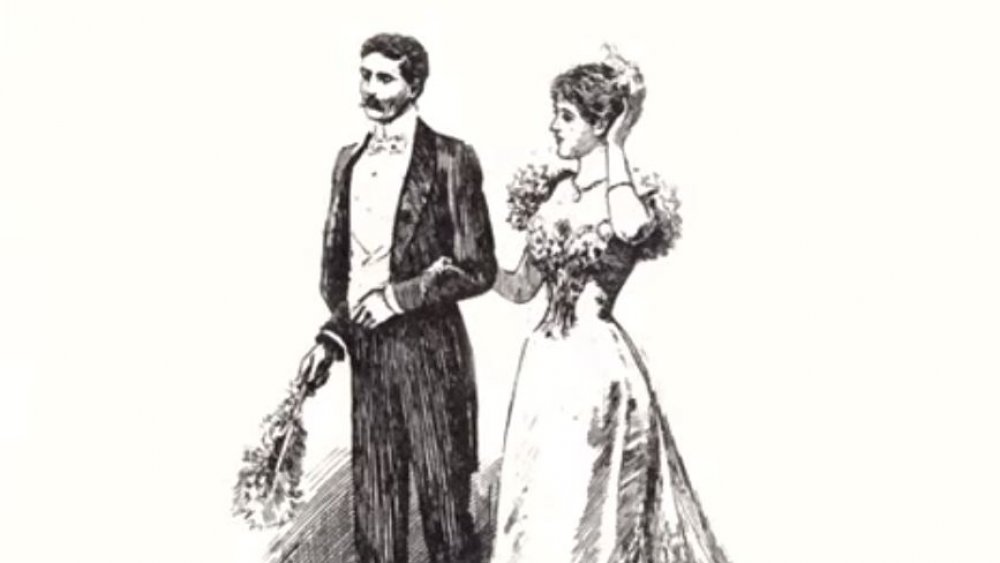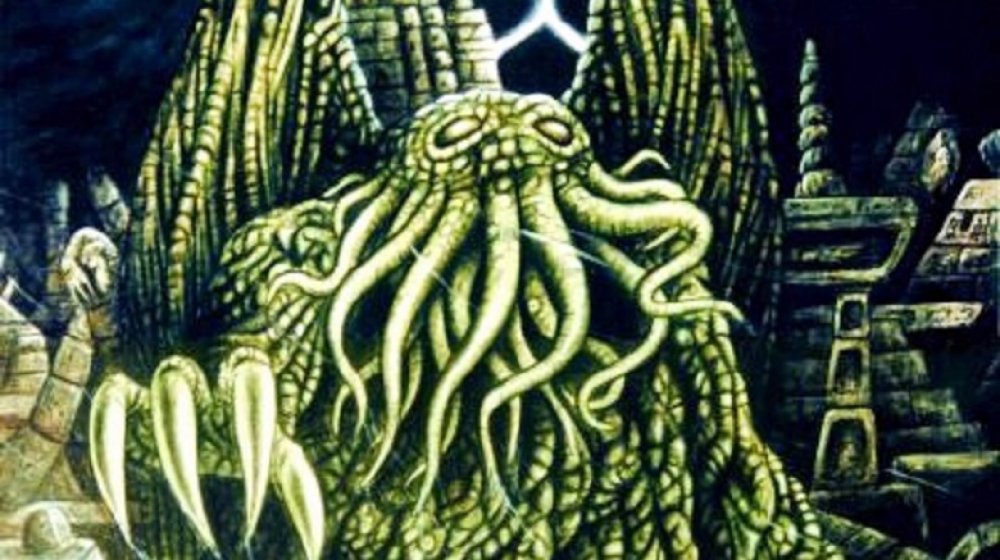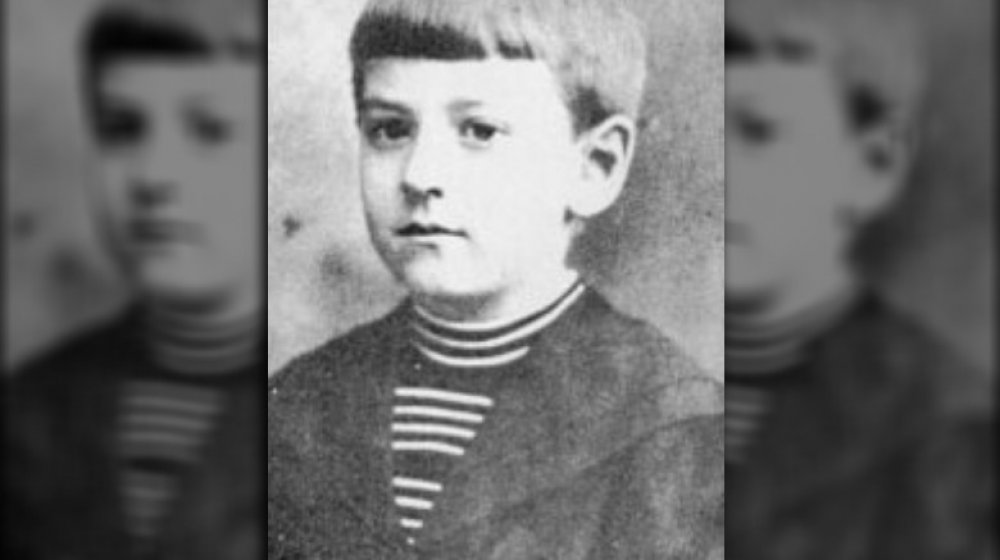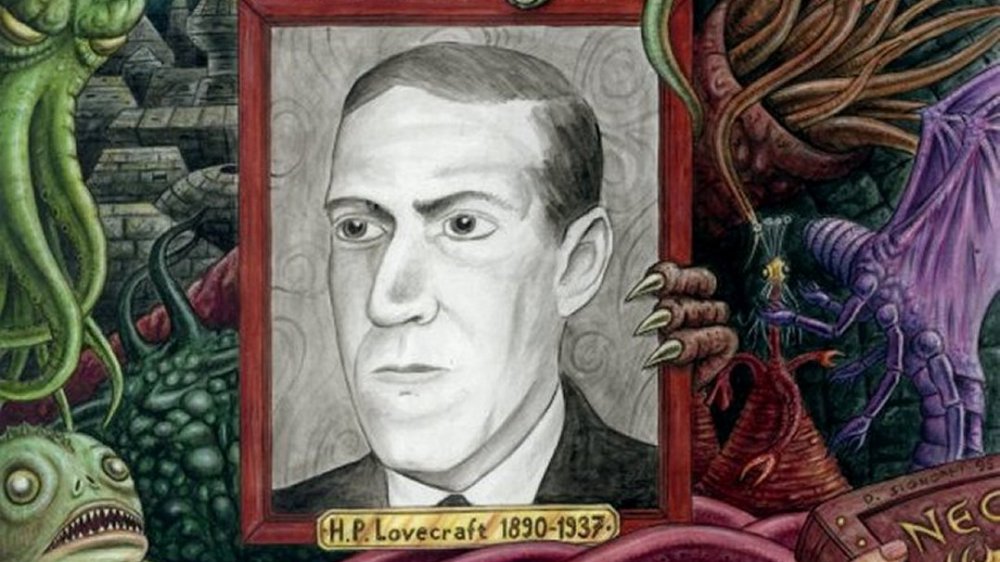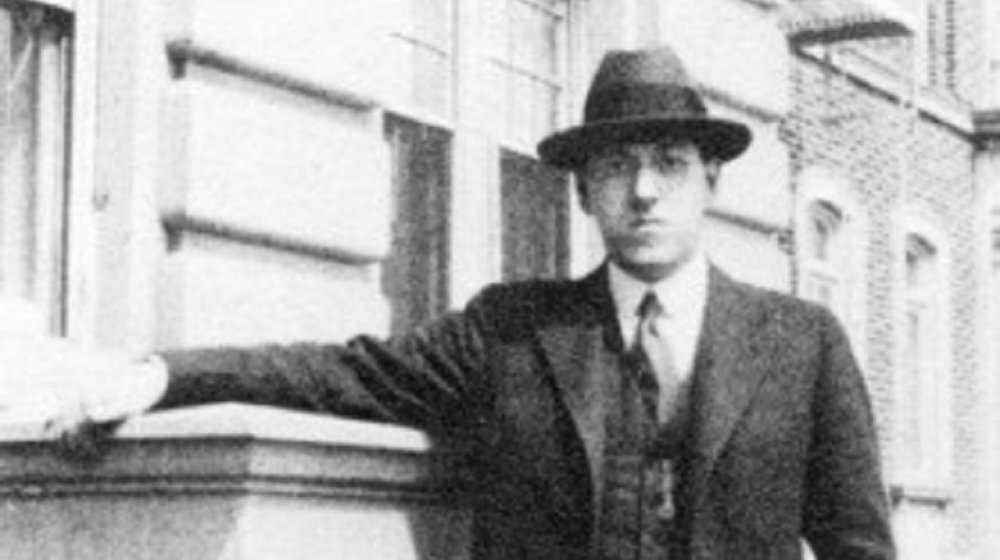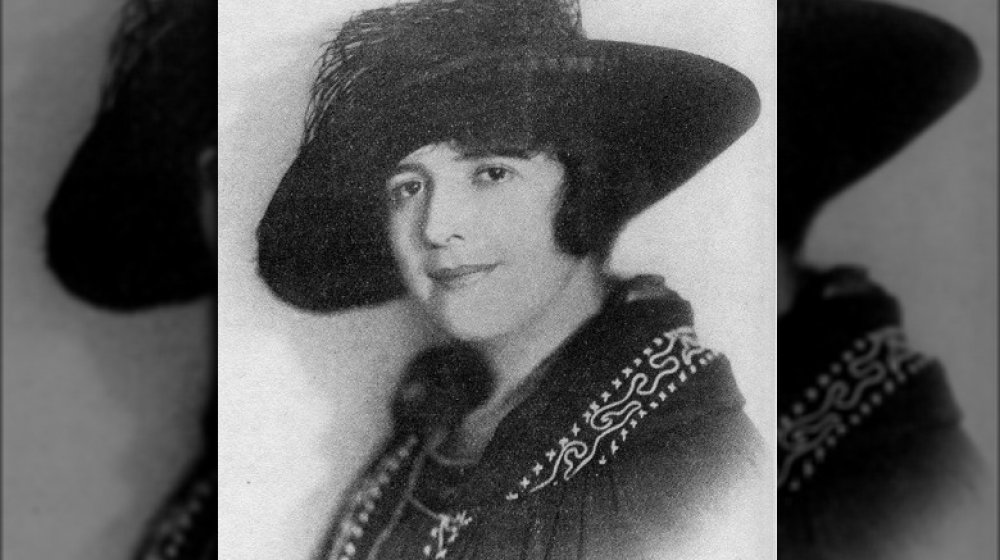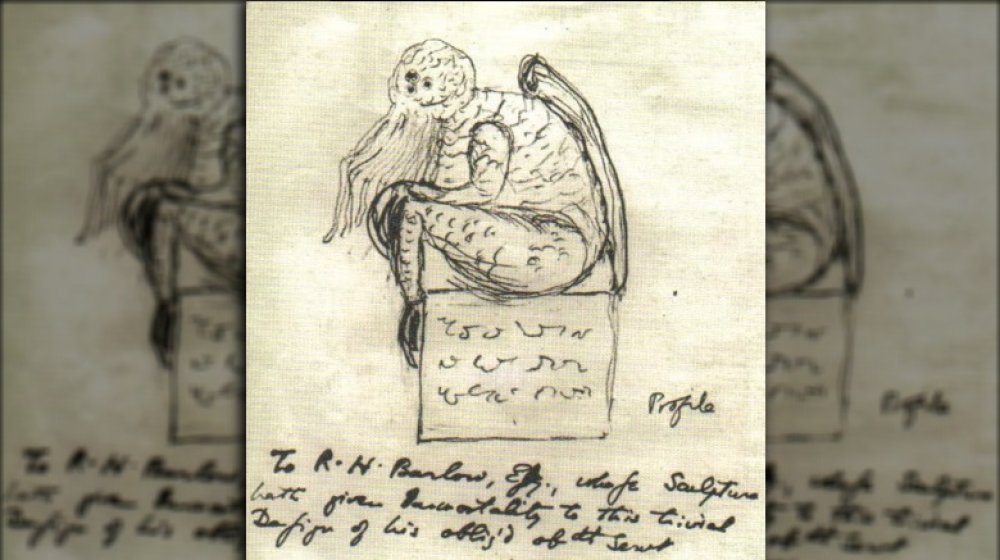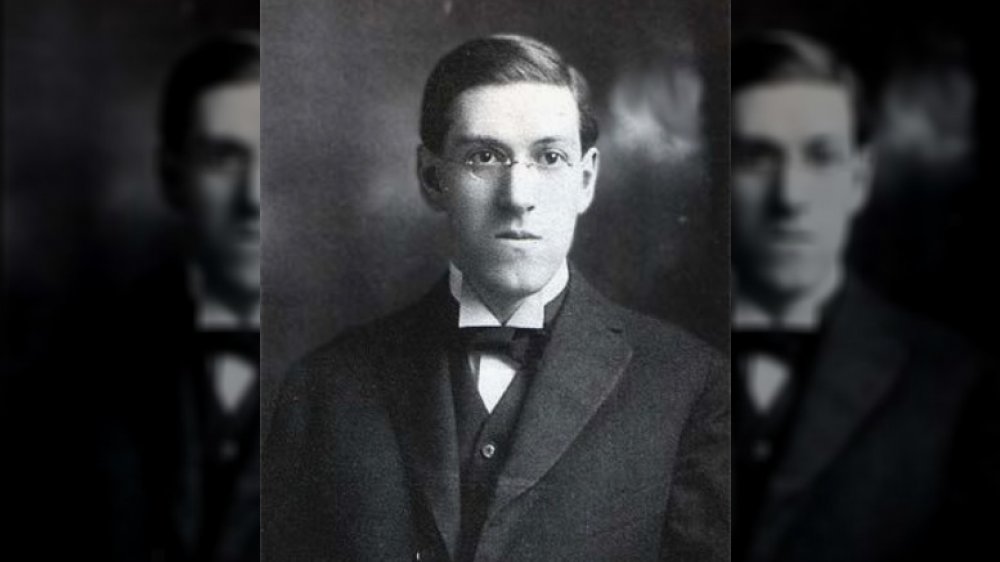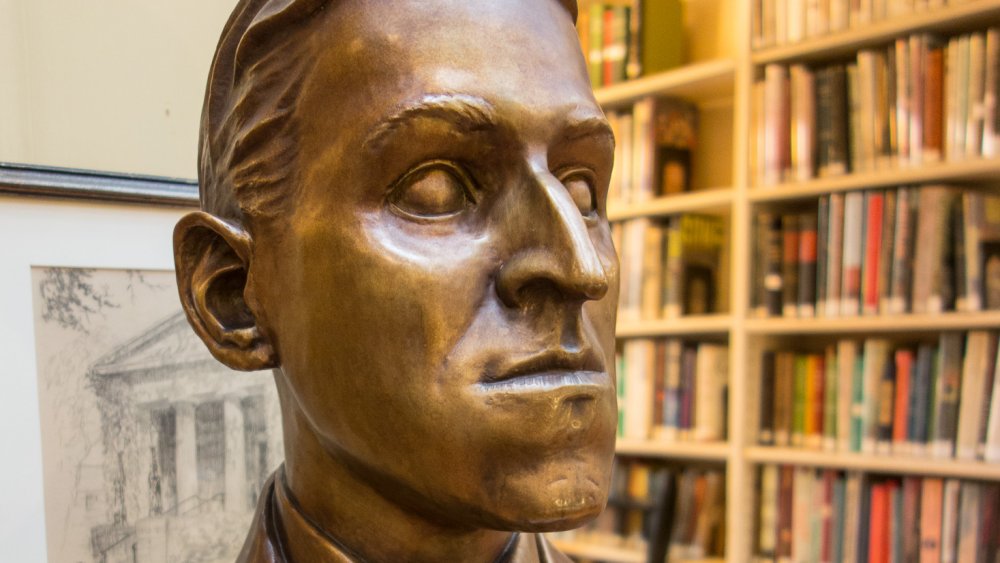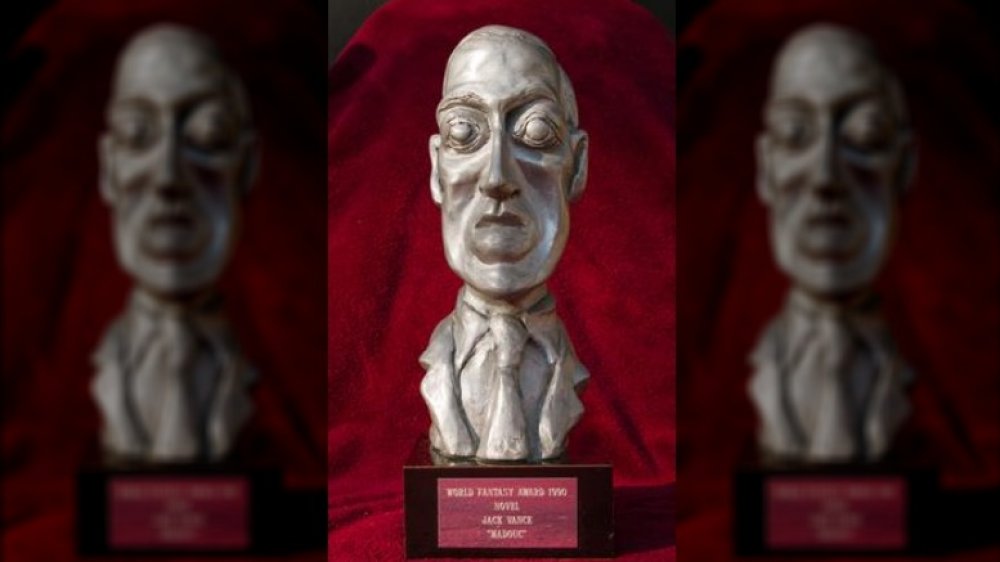The Tragic Real-Life Story Of H.P. Lovecraft
In the world of speculative fiction, there are few names as evocative as H. P. Lovecraft, the spindly figure whose Cthulhu mythology reshaped horror for over a century. Lovecraft was completely unknown during his own lifetime, but in the decades since, his unearthly influence has extended far and wide ... which has, in turn, shined a brighter spotlight on the more problematic part of his legacy: Namely, the fact that he was a blatant, unrepentant racist.
It's a tough pill to swallow. On one hand, Lovecraft's importance to literature is unarguable. On the other, his bigoted views were so disturbing, even compared to his peers, that they can't be ignored. As for the man himself, though? Put bluntly, Lovecraft seems to have been a fairly unpleasant, selfish, and bitter misanthrope, who often blamed others for his own character flaws. However, his life was also a long series of tragedies and hardships, many of which inspired his dark writings.
H.P. Lovecraft's father was committed to a mental hospital
As with so many creative individuals who lived tormented lives, the existence of the young Howard Phillips Lovecraft was jolted by tragedy from the very beginning, tragedy that, not surprisingly, reads like the prelude of a Lovecraft novella.
The problems, it seems, began with his traveling salesman father, Winfield Scott Lovecraft. When the younger Lovecraft was only 3-years-old, according to the H.P. Lovecraft Archive, Winfield experienced a nervous breakdown while on the road. This episode caused the man to be committed to Butler Hospital, a mental institution, where he remained for the following five years before dying. By this point, as explained by the Smithsonian, Howard Lovecraft was 8-years-old, and had been informed for much of his childhood that his father's institutionalization was the result of working himself too hard, rendering the man paralyzed and unresponsive: in reality, Winfield had been diagnosed with "acute psychosis," and is now believed to have suffered from syphilis. Nonetheless, as Lovecraft grew older, he stubbornly held fast to the "overwork" theory, perhaps preferring it to the sad truth.
H.P. Lovecraft was a lonely boy with terrible nightmares
Lovecraft was, according to the H. P. Lovecraft Archive, a bright and intelligent kid with a passion for knowledge. Unfortunately, he was also frail, shy, and sickly, often taken out of school due to illnesses that were both physical and psychosomatic, often leaving him bedbound. With his father gone, the boy was mostly raised by his mother, his aunts, and his beloved grandfather, a wealthy industrialist named Whipple Van Buren Phillips, all of whom helped ease his general loneliness.
During the young Lovecraft's frequent illnesses, according to the Vintage News, he often spoke of horrifying dreams that would menace him in the night. Today's researchers have speculated that Lovecraft may have suffered from a condition called sleep paralysis, wherein his body would've been locked in place while these frightening visions occurred, perhaps explaining the feelings of helplessness he often experienced. Regardless, these childhood nightmares — which often concerned unearthly monsters he referred to as "Night Gaunts" — went on to inspire his future stories: these very creatures became part of his Cthulhu mythos, appearing in the poem "Night Gaunts," and again as creatures in his novella The Dream-Quest of Unknown Kadath.
H.P. Lovecraft experienced a sad slide into poverty
Personal traumas aside, Lovecraft spent his early years with the benefit of a rather privileged upbringing, largely thanks to the wealth of his grandfather. That all changed when Lovecraft was a teenager, writes the Smithsonian, when Whipple died from a stroke, and the inheritance paperwork got all screwed up. As detailed by Paul Roland's The Curious Case of H.P. Lovecraft, the board of Whipple's business reacted to the death by dissolving the entire firm. This forced the family to desert the home Lovecraft had grown up, and cram themselves into a shabby, uncomfortable house that they had to split with another family.
By all accounts, the loss of Lovecraft's grandfather — and the family's financial misfortunes, which would only grow worse as the years went on — hit the young man deeply, to the point where his journals from the time discuss potential methods of suicide. In order to get by, it seems, Lovecraft buried his nose in his books. When not feeling sick, he spent most of his time studying, writing, and acing his schoolwork.
If you or anyone you know is having suicidal thoughts, please call the National Suicide Prevention Lifeline at 1-800-273-TALK (8255).
And then H.P. Lovecraft's mother was committed, too
During this time, Lovecraft felt especially close to his mother Sarah "Suzie" Phillips Lovecraft, and their relationship was ... weird, to say the least. Some of Lovecraft's lifelong misanthropy may have stemmed from her, considering that the Guardian describes her calling him "grotesque" during his childhood, and warning him to stay inside so people wouldn't be disturbed by him. Uh, bad parenting, much? Years later, Suzie's psychiatrist would write that he detected an Oedipal context in her relationship with her son, according to Kenneth W. Faig, Jr.'s research.
By 1919, Suzie's mental illness led to her being committed to Butler Hospital — the very same institution in which Lovecraft's father had died in, all those years before — which sent her son spiraling into a deeper depression. His feelings only worsened a few years later, according to Donald Tyson, when a botched gallbladder operation took Suzie's life, as well. Lovecraft deeply mourned his mother's passing, writing, "My mother was, in all probability, the only person who thoroughly understood me ... I shall not again be likely to meet with a mind so thoroughly admirable."
However, it should be noted that the death of Lovecraft's mother was also the point where he finally came unglued from her, whether by traveling New England or exploring the companionship of women. In the long run, unfortunately, these ventures would prove no happier for him.
Sadly, H.P. Lovecraft was horrifyingly racist (even worse than you think)
Unfortunately, no conversation regarding Lovecraft's life is complete without acknowledging that he was, indeed, a white supremacist. Casual observers sometimes write this behavior off as a product of the time he lived in, but frankly, that's no excuse: even by the poor standards of the early 20th century, Lovecraft's beliefs were appallingly racist.
How so? For one, according to LitHub, Lovecraft proudly considered himself a member of the Aryan race. He loathed Jewish refugees, approved of Adolf Hitler — in reference the Nazi leader, Lovecraft once wrote, "I know he's a clown but god I like the boy!" — and he was unsympathetic to the plight of black people being lynched in the southeastern U.S., at one point going so far as to express compassion for the white murderers, rather than their victims. According to the Willamette Week, merely walking through the diverse crowds of New York City caused him to quiver with fury. Furthermore, while contemporary Lovecraft readers may wish to "separate the artist from his art," as it were, it's hard to ignore the racism that Lovecraft so forcefully pushed into stories like "Herbert West — Reanimator," much less a certain 1912 poem that is better left in the dustbin of history.
Most significantly, as the Atlantic points out, Lovecraft never repented. Until his dying breath, he regarded anyone who wasn't from a white, Anglo-Saxon Protestant background as "subhuman," and this toxic bigotry creates real problems with his legacy today.
H.P. Lovecraft had a tattered and bizarre love life
Lovecraft wasn't one for displays of affection, and evidently, the only woman he ever kissed in his adult life was Sonia Greene, according to Wired, who went on to become his wife. Why did she marry him? God only knows. In an era where the 19th amendment was still fresh, Greene was an independent career woman who wrote, traveled, designed posh hats, and at one point even started her own business. She was also, as it happens, a Jewish immigrant. Weird, right?
If you're wondering how an openly racist person like Lovecraft could rationalize his love for someone who embodied everything he hated, well, the Willamette Week says that he claimed her marriage to him was a renouncement of her Jewish heritage — an argument that she strongly disagreed with. Not a healthy marriage, that's for sure. The world may never know why a smart, resourceful woman like Green wasted her time on such an arrogant, unhelpful sponge of a husband, but it does seem that when she was working on the road, she sent him a regular allowance in the form of mailed checks. Meanwhile, Lovecraft sulked at home, whining to her about how he couldn't afford food ... despite the fact that, throughout it all, he was too proud to even look for work, much less actually get a job.
Anyhow, when Greene left Lovecraft — finally! — she burned all their letters. However, his vicious antisemitism was presumably a big factor in the divorce.
H.P. Lovecraft moved back in with his aunts ... and a creative spree begins
Once Sonia Greene realized she'd be better off without a guy who spouted constant racist platitudes and refused to get a job, she sent him packing back to his aunts in Providence, Rhode Island, according to the Smithsonian. The last 11 years of Lovecraft's life would be spent in that city, as the family shoved themselves into increasingly small abodes with increasingly paltry funds.
Lovecraft didn't become any less bitter. He did, on the other hand, experience a burst of creativity, and it was in this final decade where he produced most of the stories for which he would one day be immortalized, as seen in his bibliography on the H. P Lovecraft Archive. "The Call of Cthulhu," for example, was first published in 1926. "The Dunwich Horror" came out a few years later, and 1931 saw the joint publication of the classic novella A Shadow Over Innsmouth — which tells of aquatic humans called the Deep Ones invading the shoreline — and the equally classic At The Mountains of Madness, which is often hailed as one of the all-time classic science fiction novellas.
So, basically, this time that Lovecraft lived with his aunts was bad for him on a personal level, but great for his work. His finances, though, were a different story.
H.P. Lovecraft had no money, no recognition, and lots of misery
The classic "starving artist" paradigm definitely applied to Lovecraft, who spent most of his life literally starving, frail, and malnourished. However, it's important to note that there's a big difference here between H. P. Lovecraft and someone like, say, Edgar Allan Poe: whereas the author of "The Raven" struggled to make a living until his writing finally earned enough recognition to pay for basic expenses, the Atlantic points out that Lovecraft simply refused to ever look for work, and never slaved away at a regular job in his entire life. Most likely, he felt that such things were beneath him.
Nonetheless, considering how famous Lovecraft is today, it's a bit astonishing when you realize how completely unrecognized he was in his time, to say nothing of the rundown conditions he lived in. By the final decade, Lovecraft's diet often consisted of eating expired canned goods, and not much else. Even then, according to the Escapist, he sometimes skipped food altogether for the sake of affording postage. This went on for years, and as Polygon points out, he slowly chewed through the remains of his inheritance until there was nothing left. By then, the condition of his body had taken a turn for the worse.
H.P. Lovecraft's health problems set in
H. P. Lovecraft didn't make it to age 50, and when you examine the many physical and psychological health issues he faced throughout his life — in addition to the poor diet he maintained — this short lifespan isn't a big surprise. His health problems began when he was a boy, according to the Los Angeles Public Library, and escalated as a teenager: shortly before graduating high school, in fact, Lovecraft suffered what he described as a "nervous collapse." Later scholars have speculated this breakdown may have been the onset of a rare neurological disorder like Sydenham Chorea, a series of uncontrollable, involuntary movements that has also been called the St. Vitus Dance. Regardless of what exactly happened, though, this condition was significantly debilitating enough that Lovecraft found himself unable to finish school.
The illness which finally took his life, according to the Guardian, was cancer of the small intestine. As a lifelong student of the weird and disturbing, Lovecraft meticulously documented every stage of his illness, in lurid detail, until his death in 1937.
H.P. Lovecraft died expecting to be forgotten
Lovecraft believed in his work. He didn't, however, expect anyone else to care about it — ever. Remember that, at the time, Lovecraft's writings were utterly obscure. Imagine if you found out that your reclusive next door neighbor occasionally sold short stories, for pennies, to a horror magazine, and you'll get a sense of how unknown Lovecraft really was. At the age of 46, shortly before the cancer claimed him, according to the Atlantic, Lovecraft wrote the sad admission that, "I have no illusions concerning the precarious status of my tales, and do not expect to become a serious competitor of my favorite weird authors."
Little did he know. Or, well, little did anyone know. Very few people took note of his passing, outside of a small circle of friends and epistolary acquaintances, and there was no reason to anticipate that such a small, unknown person would go on, after death, to become one of the most prominent horror/science fiction writers of the decade. Even Lovecraft's obituary, first printed in the Providence Evening Bulletin and now online at Grim Reviews, is chock-full of errors.
In death, H.P. Lovecraft became one of the most influential writers of the century
Lovecraft's personal views aside, the groundbreaking nature of his writing was unparalleled at the time. As detailed by Scientific American, the skill in which At the Mountains of Madness merges scientific examination with unearthly existential dread was unheard of. Back then, horror stories were usually supernatural, gothic, and mythical: Lovecraft changed that, turning horror into something you could put under a 20th century microscope and still run away screaming from. That's why his work has been so influential on creators ranging from Stephen King to Guillermo Del Toro.
The credit for Lovecraft's entrance into popular culture, as explained by Biblio, largely goes to Arkham House. This publishing company, founded by two Lovecraft fans in 1939, lovingly preserved the late author's work in collected volumes, so he would not be forgotten. Clearly, these efforts paid off. Lovecraft is now a household name, "Cthulhu for President!" pins reappear every four years, and Batman's bad guys all get thrown into an asylum named after one of Lovecraft's fictional New England towns. Today, as the Wall Street Journal points out, Lovecraft's work now sells in bigger numbers than it ever has before, and he is recognized as one of the all-time most important genre fiction authors.
However, as Lovecraft-mania hits new highs, and an increasing number of readers fall in love with his stories, the sheer brutality of his racism has only increasingly damaged his place in the history books.
H.P. Lovecraft's face was removed from the World Fantasy Award
One of the most prominent literary accolades in the world of speculative fiction is the World Fantasy Award. From 1975 onward, according to Syfy, both the award itself (pictured above) and the nominee pins featured the face of H. P. Lovecraft, an honor he never would have expected when he was alive. In the 2000s, though, the world has more closely examined Lovecraft's white supremacy. The galling nature of his views made many award winners uncomfortable, and unsure whether to even embrace the award itself in light of Lovecraft's toxicity. As author Nnedi Okorafor so effectively put it, "A statuette of this racist man's head is in my home. A statuette of this racist man's head is one of my greatest honours as a writer."
Eventually, the anti-Lovecraft outcry grew loud enough that, thankfully, Lovecraft's face was removed from the award in 2015. And honestly, Lovecraft's posthumous rejection by the very literary community he influenced is, perhaps, the clearest example of how complicated his legacy truly is: yes, he was one of the most important genre writers of all time, but yes, he was also a toxic bigot, whose views should be condemned instead of ignored. This twisted picture doesn't fit into a neat little box, which makes Lovecraft's place in history difficult to grapple with.
... but yeah, c'mon, nobody should ever have to take home a statue with some viciously racist white man's face on it.
